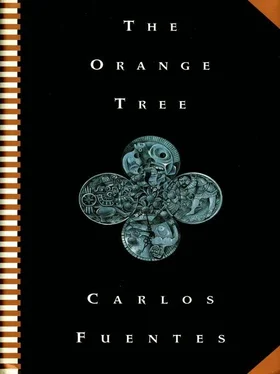“Never saw a dead man before?” repeated Snow White with an exasperated tremor. “Think we’re never going to die, that we’ll always live happily ever after, that we, just because we’re us, are the only ones who will never die?”
Captured in a silence and a calm more terrifying than any squall, the seven women said nothing, became pensive, and I, stretched out on the deck, really began to tell them apart. Did I have to die in order to individualize them, de-Mexicanize them, de-thirdworldize them?
I stared at them fixedly and almost came back to life in surprise: in death, I could clearly see the images that passed through the minds of the living. I understood it this way, directly and simply: This was my new, my real power. This was death’s gift to me. Was its name immortality? Snow White asked her question—“Never saw a dead man before?”—and Sleepy metamorphosed into what her real name was when she awoke to life, María de la Gracia. And I, thanks to my new powers, saw in her eyes a dead child in a little box painted white in a shack where the candles were stuck into Coca-Cola bottles.
Bashful’s real name was Soledad, and the death that passed through her eyes was that of an old man with open eyes who thanked her for accompanying him to the end, because dying alone is the most terrible thing in the world.
Doc in reality was Doris, and I recognized her death because it took place in the Mexican part of Los Angeles. Doris, a knapsack on her back, was walking along with a little girl more beautiful than a Diego Rivera drawing. She was holding the little girl’s hand as they walked down a street lined with stone walls. Suddenly two street gangs started shooting at each other from opposite sides of the street. The knapsack and the books inside it saved Doris. The little sister — Lupe, Lupita, nobody sweeter — died instantly. In tears, Doris went down on her knees, and because of that the last bullet didn’t blow her brains out.
Never saw a dead man before? Sneezy’s name was Nicha (Dionisia). She grew up at her mother’s side in a whorehouse in the port of Acapulco. There was a big, central dance floor, crummy little lights, and neon beer signs. All that passes through her eyes when Snow White asks them if they’ve never seen a dead man before. Nicha pushes the sight of death aside with a vision of tangled mangroves and burned-out lights. She relives a long wait in one of the rooms surrounding the dance floor. There are three smells. The natural smell of the tropics, which are eternally rotting, and the disinfectant spray used to clean the floors, bed, and lavatory. But the third aroma is that of an orange tree that miraculously grows outside the little room and tries to poke a branch, a perfume, a flower, occasionally a fruit through the window to overwhelm the smells of rotting and disinfectant. She already knows she has to hide under the bed when her mom comes in with a man. She hears everything. That is her image of death. The memory of the orange tree saves her.
On the other hand, big-eared Dopey from time to time recalls a girl with the improbable name Dulces Nombres de Cristo — Sweet Names of Christ — which is she at the age of ten. She’s walking among unsleeping dogs and potholes filled with muddy water, among hundreds of buses standing like elephants in front of a river of cement, among hundreds of taxis that seem to besiege downtown Acapulco, duplicating the city with a squadron of motors. The taxi drivers wash their cabs at night for the next day’s work, while Dulces’s mother, drunk, her legs spread, laughs, sings, shrieks, and fans her cunt at the door to the cabaret.
What haven’t they seen? No, Grumpy’s mind is a blank. Through it pass only deaths in Technicolor, deaths I recognize. Movie dead men, gangsters, cowboys, dead men covered with ketchup. Her name’s Otilia, and she doesn’t allow a single real dead man into her head. But the last one, Happy, the hardest-working, whose name is Dolores, offers me a long vision of rivalries, always two men killing each other over her, killing each other over her with pistols, knives, clubs … These rivals for Dolores’s favor are buried up to the knees in the hard, imprisoning earth, the way the two men are in a famous picture by Goya. Where could Dolores have seen that picture? It seems inconceivable to me that she would have a Goya in her head. Could my vision be tricking me, am I fooling myself with everything I see? As if she obeyed an impulse from death (mine), the girl lights a cigarette with a match taken from a matchbox with the label “Classics” on it. She protects the flame with the box in order to light her cigarette. And there’s Goya’s terrible, black painting: on a matchbox. It’s the portrait of the bitterest fatality.
In the afternoon
These memories took more time than you might imagine. The chronology of memory in death is different from what it is in life, and the communication between the two consumes hours and (I still don’t know this) days. I’ll miss, I’m sure of it, this pause in memory. Because now practical problems take precedence over everything else.
I’m dead.
They admit it.
The first item then is what to do with me.
Dulces Nombres de Cristo reveals her dopiness when she asks that I be tossed overboard. “That way,” the savage says, “there won’t be any evidence of what happened.” I hate her and put a curse on her: I hope you’re locked up in an English asylum and fed porridge until you rot, bitch.
Otilia agrees energetically. “What happens if they catch us with this dead guy? We’re in the clinker, my dears. Nobody’s going to ask how it happened. We’re guilty. We were born guilty, don’t be jerks.”
A terrible murmur of approval grows. Dulces and Otilia grab my arms, and Nicha helps them out, taking hold of my ankles. Soledad joins in to speed up the operation. I feel the foam of the waves caressing my ankles.
Doris saves me. “Are you dumbbells or what? In a little while another boat’s going to pick us up. They’ll ask us what we’re doing alone in a yacht. Then they’ll ask if any of us know how to drive it. None of us does, right? Then they bring us back to Acapulco. They find out that the gringo hired this thing and hired us at the same time. Seven whores and their madam and a disappeared gringo, murdered or who knows what. That’s about when they’ll put us on ice, Otilia.”
They don’t drop me, either into the sea or back onto the hard deck, let it be said to their honor. They make me comfortable, with all due respect, on the bench that runs along the gunwale.
Snow White says Doris is right. Does anyone know how to drive one of these boats? Dolores asks if it’s the same as driving a car.
Later on
No, it isn’t the same. Stretched out on the bench, staring at the sky, I also see the trapeze of the boom sail set between the triangular sails of the jibs, properly raised, but which, because they’re not receiving either attention or (more important) nautical intention, will soon sag and fall, prematurely aged, wrinkled. Because a good sail knows the intentions of the sailor. A good hull is ready to obey even the slightest wish of a wise sailor. The absence of that seems to discourage the sails, which communicate it to the mast, which in turn trembles down to its base, where it joins the keel.
In other words, they don’t know what to do. The gasoline will run out. The boom sail and the jibs will be pushed by a soft tropical breeze. Each cough of the motor makes them shake with fear. Finally, when the sun disappears, the seven of them will huddle together. They will form a kind of medieval galliard dance (I made a costume movie in Italy about the plague in the thirteenth century), which will culminate with them hugging Snow White’s fat legs. With her eyes fixed on the darkened horizon, the owner of the Fairy Tale will not release the tiller of The Two Americas. Then the sun will sink into the sea, and the seven will whimper together, a deep, almost religious, wail.
Читать дальше












